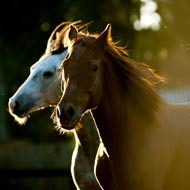Redwings report provides new insights on strangles

More than a third of respondents (36 per cent) believed strangles to be ‘an airborne disease like flu’.
Myths and negative attitudes about strangles could be preventing horse owners from taking action to prevent the disease, a new survey suggests.
Redwings Horse Sanctuary carried out the 2016 survey in collaboration with the University of Liverpool, after a strangles outbreak in one of its own herds in 2015.
Survey responses from nearly 5,000 people revealed an interest and a willingness among horse owners to improve biosecurity and invest in screening.
However, the survey also revealed more than a third of respondents (36 per cent) believed it to be ‘an airborne disease like flu’, whereas in fact it is spread through direct contact with an infected animal or infected material. Redwings believes this misconception may be giving weight to the idea that owners are unable to prevent the disease.
A large proportion of respondents felt it was ‘not possible’ to eradicate strangles in the UK (49.3 per cent partly or completely agreed). Worryingly, 16.6 per cent of respondents said one of the ‘main reasons’ they did not take further steps to prevent strangles was because they believed it is ‘not possible to prevent strangles/it is just something that happens’.
Horse owners who had not experienced strangles tended to be more pessimistic - the attitude being largely that it is a ‘life-threatening disease’ and something that is ‘difficult to treat’. Those with experience of strangles tended to be more pragmatic about prevention and management.
Survey pioneer Andie Vilela explained: “It is not only strangles that we need to stamp out, but the attitudes and perceptions towards the disease that prevent or undermine motivation for horse owners to act.”
While the majority of respondents (90 per cent) thought strangles should be more of a priority in the UK, only 13 per cent of those who kept their horses at a livery yard had them screened for strangles on arrival, and nearly three quarters did not have a screening protocol for new arrivals.
This lack of screening does not appear to be down to a lack of willingness to follow protocol, according to Redwings, as 79.6 per cent said they were ‘very likely’ or ‘likely’ to use a yard that had strangles testing for new arrivals. And nearly 80 per cent of respondents said they would be prepared to prove their horse was not a ‘silent carrier’ by paying for screening.
Awareness and understanding of the symptoms were also good, with the majority correctly identifying fever (92.5 per cent) and, albeit later, the classic nasal discharge (96 per cent), as clinical signs of strangles. Forty-three per cent had personal experience of strangles, of which nearly half said the case was confirmed by a vet.
The survey launched last year as part of the charity’s Stamp Out Strangles campaign. Andie Vilela said she has “real confidence” in the next stage of the campaign, which involves increasing owner awareness, improving biosecurity measures and eradicating the disease among the horse population.
“I believe the key to achieve this is more screening on yards and for carriers to be cleared of the disease,” she added.



 The latest
The latest